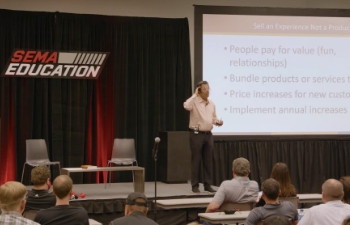RETAIL BEST PRACTICES
Small-Business Hacks
14 Shortcuts for Success
By Chad Simon

Moltz advised attendees to sell an experience rather than a product when they go to raise their prices, because people will pay for value.
Barry Moltz revealed 14 of his 100 shortcuts to success at his education session—aptly named after one of his books, Small Business Hacks—during the 2021 SEMA Show in Las Vegas. The author—a three-time entrepreneur, public speaker and business consultant—kept it lively by telling jokes (often at his own expense), asking what strategies attendees used to grow their businesses and handing out $5 bills to those who played along.
Without further ado, the following is a sampling of Moltz’s hacks for small-
business owners:
How do you get more online reviews and why are they important?
Online reviews provide businesses with credibility and attract more customers, so the idea is to continuously gain more reviews wherever customers are looking.
“When you go to Amazon, you read the reviews because you believe them as much as you would believe someone who refers you,” Moltz said.
However, he advised business owners to solicit reviews in a systematic way as part of their marketing strategy by posting signs or logo endorsements and asking for them on receipts, tickets or follow-up emails. Moltz recommended using a customer relationship management system, such as Nicejob or Birdeye, which, for $20 a month, will automatically send emails and texts to customers asking for a review and whether they’ll approve putting it on social media.
How do you respond to negative reviews?
Not everyone will have a great experience, but the hope is that 95% of customers will. According to Moltz, there are three types of people who write reviews: the ones who are unhappy, those who really like you, and those you pay to write a review. How do you know if you get a bad review? Google Alerts, Buzz Sumo, Talkwalker and Yelp are free services that notify you when someone writes about you on the web.
“When you get a bad review, you can’t get angry,” Moltz said. “It’s not about you, but you can’t ignore them either. Happy people will tell five other people, and unhappy people tell 25 people. Customers just want to be heard and receive empathy. Don’t just look at the good reviews; read the bad reviews to see if management responded, because if they did, it means if I have a bad experience, chances are they will respond to me. How you respond is important. Apologize for how they feel. Ask them to contact you offline to resolve the problem in a way that’s fair to them. Follow up with them, and if they’re satisfied, ask them to remove the bad review.”
How to raise prices
Business owners are afraid they’ll sell less and lose customers if they raise their prices.
“People will pay for value,” Moltz said. “The wrong way to do it is to let them know you raised your prices at the bottom of their receipt or added a COVID surcharge. Raise your prices, but don’t give your customers a surcharge. Dropbox did it well. They raised their prices by 20%, but they added more value. Why does a Harley cost more than a Honda? It’s all about brand awareness or the idea that you’re getting more value.”
It’s inevitable that business owners must raise their prices at some point, and when they do, Moltz advised that they sell an experience, not a product.
“Trying to be a low-cost business is a straight path to the bottom, and you won’t make any money,” he said. “If you’re afraid to raise your prices, try it first on your new customers and see how that goes, or raise prices every year so people expect it. If you can add an increase on the top line, it should trickle down to your bottom line and make you more money.”
How to negotiate anything
Know what you’re worth without caring if the customer says no. You can’t want the deal too much or else you’ll lose your leverage. Be willing to walk away.
“It’s like when you’re buying your dream house and you really want it, you keep bidding up and you end up paying a lot more money for it,” Moltz said. “Recognizing dirty negotiating tactics is the key to being successful. There’s ‘Good Cop, Bad Cop’ where two people negotiate with you; one is nice and one is not. ‘Left at the Altar’ is when you go to sign the deal and they don’t show up. ‘Calling a Higher Authority’ is when the customer has to check with their wife or boss.”
How to survive a government audit
Know your rights and get help. Don’t disclose anything you don’t have to; answer questions narrowly.
How to work a tradeshow
Have a plan and know what you are trying to accomplish. Think about why you’re there and set goals for the event. Make sure to follow up, because relationships have to be nurtured.
How to read your web stats
Use Google Analytics to find out if your marketing strategy is working. It tells you who’s coming to your website, where they are coming from, how they found you, and what pages they visited once they landed on your website, among countless other statistics. Are they typing in your URL? Are they searching on Google, social media or a back link from someone else’s site to your site? In the Google Search console, you can find out what keywords people type into the search engine to visit your site.
How to get PR in the media
Try to make your public relations strategy a part of whatever current events are going on around the world at that moment.
“Cars are a hot topic right now because they’re hard to get,” Moltz explained. “You can’t get a new car, and can you believe what a used car costs these days? To get good PR, sponsor a local sports team or get involved in local charitable organizations.”
How to read financial statements
According to Moltz, only 75% of the small-business owners he met with before COVID knew how to read a profit-and-loss statement; only 25% could read a balance sheet; and only 5% could read a cash-flow statement.
“If you don’t know where you’ve been, you don’t know where you’re going,” he said. “If you don’t understand what these things mean, it’s okay, but you’ve got to be able to figure it out because if you don’t know your past results, you don’t know where you’re going in the future. Start small. What’s my revenue for the month, and what are my expenses?”
How to maximize profitability
Profit is why you are in business. The problem is that business owners usually pay themselves last.
“Put something for yourself into your expenses, because if you can’t pay yourself, you don’t really have a business,” Moltz said. “To maximize profitability, find customers who are willing to pay for your service or product, and don’t charge based on your time or cost. Charge based on the value you bring and what you’re giving.”
How to get your marketing email opened
You can’t sell anything to anybody; you have to be there when customers are ready to buy, according to Moltz. When they have a problem, they’ll think of you.
“Two-hundred billion emails are sent per day,” he said. “The key metric is email open rate. People don’t open them because of bad subject lines. Instead of ‘Aftermarket Service Newsletter,’ call it ‘The Hottest Car Modifications for 2021.’ Personalize the email by using your name. Use intriguing titles. Be controversial. Negativity sells. Use words such as ‘worse,’ ‘wrong,’ ‘absolutely,’ or ‘no fewer.’ Be exclusive. Use words such as ‘VIP invitation,’ ‘limited-time deadline,’ ‘only three seats left!’ or ‘once-a-year event.’ However, be careful about spam traps; don’t use words such as ‘free,’ ‘reminder’ or ‘help.’”
How to legally spy on your competitors
Sign up for their mailing lists and like them on social media. Put them into Google Alerts to find out when people mention them. Learn who they follow on social media and who follows them by using tools such as Fan Page Karma or Follower Wonk. Track their back links for their website using Moz Onsite Explorer or Majestic Site Explorer.
How to get a prospect to respond
People are afraid to tell you “no,” so send an email entitled “Please Reply A, B or C.” This works 90% of the time, according to Moltz.
I have not heard from you recently about working together. Is this because:
a) I am no longer interested.
b) I am still interested but busy, so contact me in a week.
c) I have been busy, but I am now ready to get started with your company.
 Let bad employees go
Let bad employees go
According to Moltz, bad employees can bring down an entire company, and they’re stealing from you because they’re not doing their best and they’re not part of the company’s culture.
To learn more about Moltz’s shortcuts to success and for more information, visit https://barrymoltz.com.








